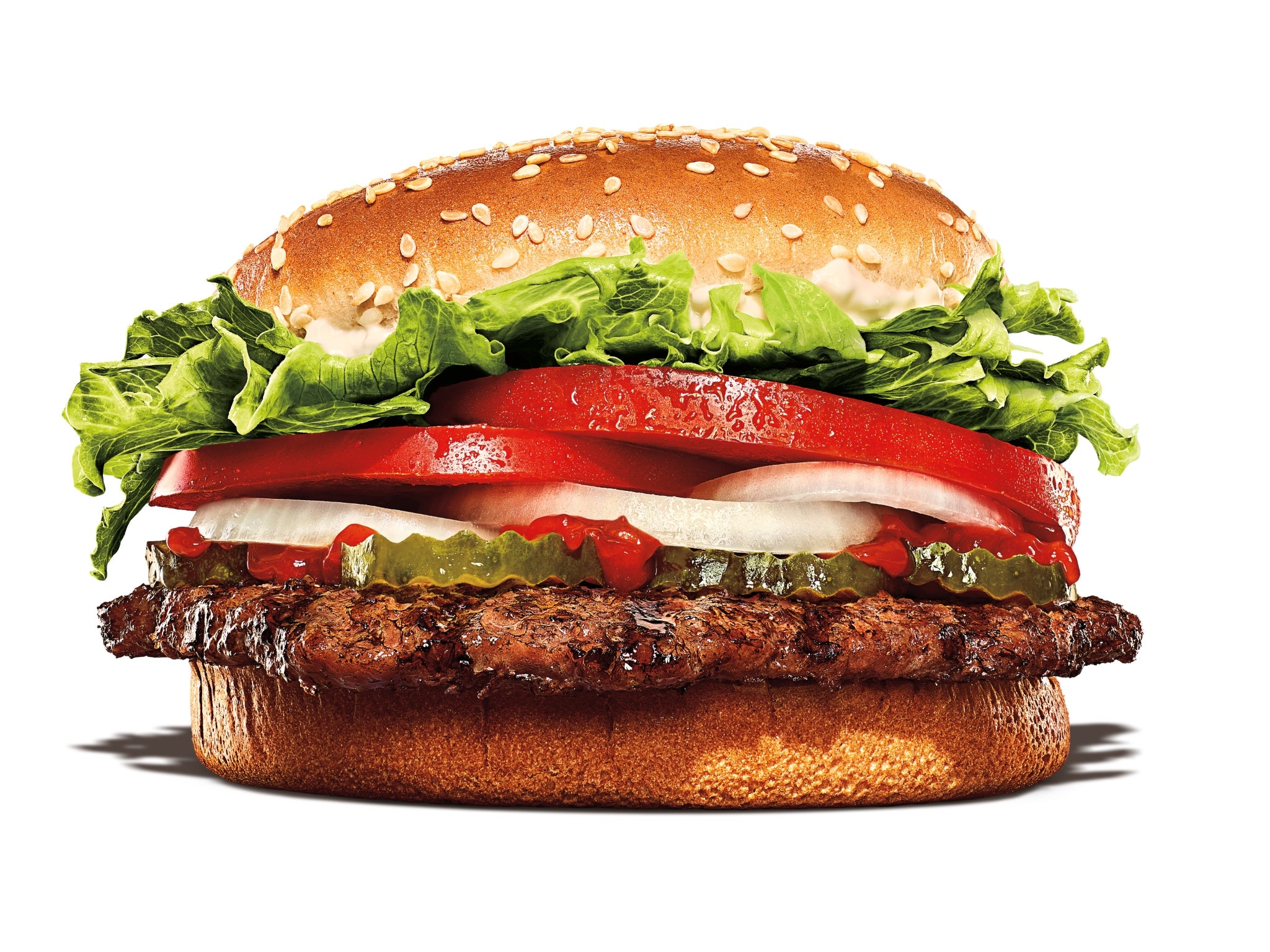Burger King Whopper 35 per cent smaller than portrayed in ads, lawsuit says
Burger King did not immediately respond to a request for comment from The Washington Post

Your support helps us to tell the story
From reproductive rights to climate change to Big Tech, The Independent is on the ground when the story is developing. Whether it's investigating the financials of Elon Musk's pro-Trump PAC or producing our latest documentary, 'The A Word', which shines a light on the American women fighting for reproductive rights, we know how important it is to parse out the facts from the messaging.
At such a critical moment in US history, we need reporters on the ground. Your donation allows us to keep sending journalists to speak to both sides of the story.
The Independent is trusted by Americans across the entire political spectrum. And unlike many other quality news outlets, we choose not to lock Americans out of our reporting and analysis with paywalls. We believe quality journalism should be available to everyone, paid for by those who can afford it.
Your support makes all the difference.Walter Coleman thought his Burger King burger was going to be large and satisfying – as glorious as the advertisements portrayed it. But Coleman and countless others felt cheated when they discovered the actual size of their burgers, a new lawsuit alleges.
Now, Coleman and other plaintiffs are leading the charge in a class-action lawsuit against Burger King in a bid to hold the company accountable and get their money back.
The lawsuit, filed last week in the U.S. District Court in Southern Florida, alleges that Burger King is misrepresenting the size of its food in its advertisements and that customers are continually duped into buying a substandard product. In addition to monetary damages, the lawsuit also demands that Burger King “correct the deceptive behavior.”
Burger King did not immediately respond to a request for comment from The Washington Post early Wednesday. In a statement to CBS Moneywatch, a spokesperson said: “Burger King does not comment on pending or potential litigations.”
Burger King advertisements portray the company’s burgers with “oversized meat patties and ingredients that overflow over the bun to make it appear that the burgers are approximately 35 per cent larger in size, and contain more than double the meat,” the lawsuit states.
But according to photos included in the lawsuit, customers are paying for puny, ersatz versions of what’s shown in ads. The complaint cites tweets from angry customers and media reports to argue the problem is widespread.
“Burger King’s advertisements for its burger and menu items are unfair and financially damaging consumers as they are receiving food that is much lower in value than what was promised,” the lawsuit states.
The action against the fast-food chain is one of many recent lawsuits against food and drink companies for false advertising. In October, a New York woman filed suit against Kellogg for $5 million, alleging that its Strawberry Pop-Tarts do not contain as many strawberries as advertised. A judge last week dismissed a lawsuit with similar allegations about Strawberry Pop-Tarts, Reuters reported.
More than 280 such cases were filed in 2021, NPR reported. Class-action lawsuits against food and beverage companies have spiked dramatically in recent years, thanks largely to one New York-based lawyer, Spencer Sheehan, who helped file the Pop-Tarts lawsuits, according to NPR.
Sheehan is not working on the Burger King case. It is being handled by Florida-based attorney Anthony Russo.
Russo told The Washington Post that the lawsuit is important to hold large corporations like Burger King accountable. “Little situations - what some would consider to be a little situation like this - could lead to unfettered behavior from big corporations,” he said.
Left unchecked, misleading advertisements could become the “a rule rather than an exception,” Russo added.
In July 2010, British regulators found an ad for Burger King’s Tendercrisp chicken sandwich to be misleading and ordered it off the air, the lawsuit notes, citing a BBC report. The ban followed customer complaints of the Tendercrisp’s size and an investigation by the Advertising Standards Authority that concluded “the burgers in the hands of an average-sized man . . . did not fill the hands to the same extent as the burger featured in the advert.”
The Tendercrisp is not included in the current lawsuit’s list of items whose proportions Burger King has allegedly “overstated.” But the list is long, and it includes items such as the Single Quarter Pound King, Fully Loaded Croissan’Wich and the chain’s signature sandwich, the Whopper.
The lawsuit alleges that Burger King began to exaggerate the size of its menu items in September 2017. Anyone who bought an “overstated” Burger King item between then until the lawsuit is resolved is considered a member of the plaintiffs’ class, according to the suit.
“Big or small, justice is justice, and laws are laws,” Russo told NBC News. “And just because something happens to appear in someone’s opinion to be minor doesn’t mean that it is.”
Join our commenting forum
Join thought-provoking conversations, follow other Independent readers and see their replies
Comments